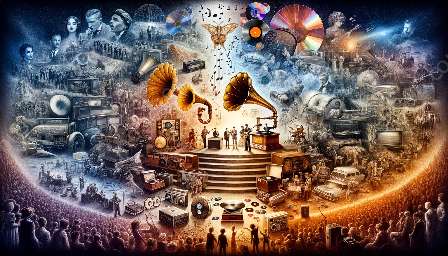The advent of radio and television revolutionized the music industry, leading to significant changes in how music is created, distributed, and consumed. This transformation has shaped the evolution of the music business in profound ways, influencing the relationship between artists, audiences, and commercial entities.
The Rise of Radio: A Game Changer for Music
Radio emerged as a powerful medium for music dissemination in the early 20th century. Prior to this technology, live performances and sheet music were the primary means of experiencing music. With the invention of radio, music could be broadcast to a mass audience, allowing artists to reach listeners far beyond the confines of live venues. This expanded reach created new opportunities for musicians to gain popularity and exposure, ultimately shaping the dynamics of the music business.
Radio also played a pivotal role in shaping musical tastes and trends. As certain songs and genres gained widespread airplay, they became part of the cultural zeitgeist, influencing audience preferences and impacting record sales. This phenomenon marked the beginning of the close relationship between media exposure and music's commercial success, a trend that continues to this day.
The Era of Hit Singles and Chart Dominance
Radio airplay became a critical factor in an artist's commercial success, leading to the rise of hit singles and chart dominance. Songs that received substantial airplay on popular radio stations often achieved higher sales figures, contributing to the emergence of a singles-driven market. This shift in consumer behavior prompted artists and record labels to focus on creating radio-friendly tracks that could capture the attention of audiences and garner extensive airtime.
As radio became a primary platform for discovering new music, it exerted significant influence over the music industry, affecting promotional strategies, artist branding, and overall creative direction. The ability of radio stations to shape audience preferences and drive record sales underscored the power of mass media in the music business, establishing a symbiotic relationship between radio broadcasters, record labels, and artists.
Television's Impact: From Performance to Marketing
The introduction of television further transformed the music industry, offering a visual dimension to music consumption. Television enabled audiences to witness live performances, music videos, and interviews with artists, creating a more immersive and interactive music experience. This visual element not only enhanced the appeal of music but also provided a powerful medium for artist promotion and brand building.
Television appearances became pivotal for artists vying for mainstream recognition, as live performances and interviews on popular shows contributed to their visibility and fan base expansion. Additionally, music videos became a crucial marketing tool, allowing artists to convey their artistic vision and connect with audiences on a deeper level. The music video format revolutionized the way music was marketed and consumed, playing a central role in propelling songs and artists to stardom.
Distribution and Monetization: The Radio and Television Effect
Radio and television not only influenced music consumption and promotion but also impacted the distribution and monetization of music. The extended reach of radio and television broadcasts facilitated the rapid dissemination of music to diverse audiences, enabling artists to gain widespread recognition and commercial success. This broad exposure transformed the dynamics of the music market, shaping the distribution strategies employed by record labels, publishers, and artists.
Furthermore, the association of music with visual content on television provided new avenues for monetization. Advertisements, sponsorships, and music licensing for television shows and commercials became significant revenue streams for artists and content creators, propelling the music business into the realm of cross-media collaborations and branded content ventures.
The Evolution of Music Business Models
The impact of radio and television on the music industry led to the development of new business models and revenue streams. The concept of payola, wherein record labels offered financial incentives to radio stations in exchange for airplay, became a controversial aspect of the industry, influencing the commercial success of certain songs and artists. As regulatory measures were implemented to curb such practices, the music business underwent shifts in revenue generation and promotional tactics.
Moreover, the rise of music television networks and channels gave rise to opportunities for music video placement and sponsorship deals, revolutionizing the symbiotic relationship between visual media and music. Additionally, the influence of radio airplay on music charts and sales figures perpetuated the singles-driven market, prompting artists to tailor their creative outputs to cater to radio and television audiences.
Reimagining Industry Practices in the Digital Age
The digital revolution further transformed the music business, reshaping the impact of radio and television on music consumption and commercial success. With the advent of online streaming platforms, social media, and digital content creation, artists have gained greater control over their music's distribution and promotional strategies.
Streaming services have proliferated as the primary mode of music consumption, challenging the traditional dominance of radio and television in shaping audience preferences. Artists are now able to reach global audiences directly through digital platforms, bypassing the gatekeeping influence of traditional media entities and redefining the dynamics of music promotion and discovery.
Conclusion
The advent of radio and television has indelibly shaped the music industry, influencing the creation, distribution, and monetization of music. These mediums have played a pivotal role in propelling artists to stardom, shaping audience tastes, and redefining industry practices. As the music business continues to evolve in the digital era, the legacy of radio and television's impact remains embedded in the foundations of the industry, reflecting the enduring influence of mass media on music culture and commerce.









































